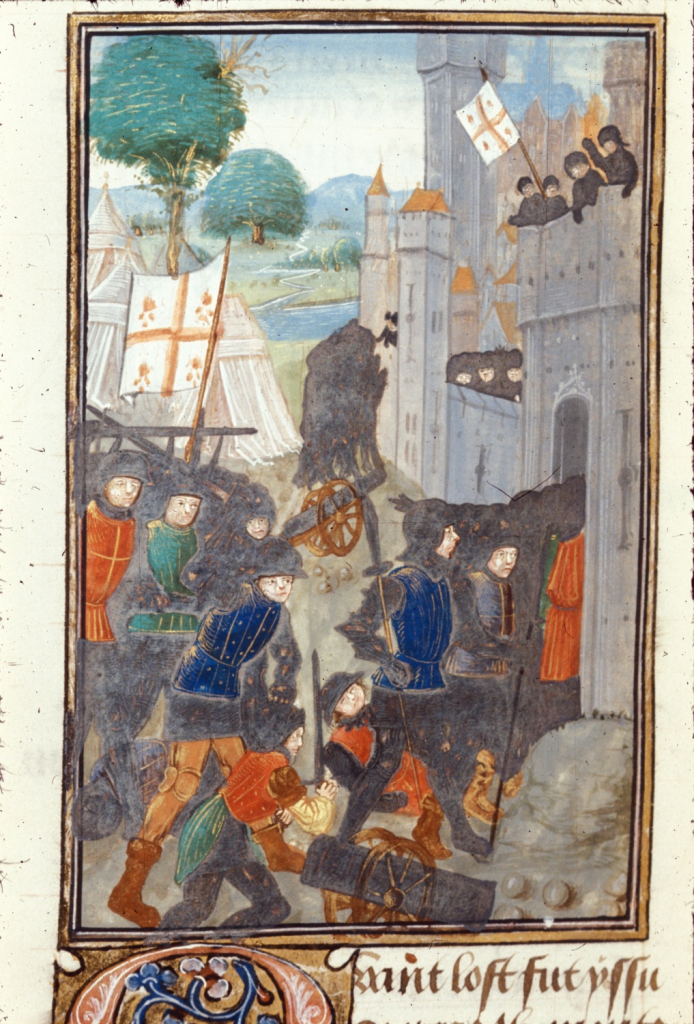The recent Hamas attacks serve as a painful reminder of the costs of occupation
Asaf Siniver is Professor of International Security, University of Birmingham
Cross-posted from The Conversation

Capture of Gaza by Saladin’s army in 1187: British Library/Creative Commons
The US president, Joe Biden, has warned Israel that occupying Gaza “would be a big mistake”. The warning seemed to be aimed directly at voices within the Israeli government who are calling for Israel to not only destroy Hamas, but also to occupy the Palestinian territory.
Biden supports Israel’s right to defend itself and to destroy Hamas’s military capabilities. But, if history is anything to go by, then occupation – as a strategy to destroy Hamas – seems doomed to fail.
The Gaza Strip was under Israeli military occupation following the June 1967 war (previously it was occupied by Egypt) until Israel unilaterally withdrew from the territory in 2005. This included the removal of 21 settlements comprising 8,500 Israeli civilians who were living amid 1.4 million Palestinians.
The realities of occupation
The occupation of Gaza required the diversion of significant military and economic resources to protect the settlers in a land with which most Israelis did not feel a sense of kinship. Polls from 2004 and 2005 of Israeli public opinion showed that between 53% and 60% supported the disengagement plan.
Indeed, the recent Hamas attacks serve as a painful reminder of the costs of occupation.
In response to rising tensions in recent weeks in the West Bank and East Jerusalem (both occupied by Israel since 1967 and previously under Jordanian occupation), the Israeli army diverted its entire Gaza division to protect Israeli settlers in the West Bank and to prevent a deadly escalation there over the Jewish holidays. This left the Israeli military significantly under-equipped and under-manned to respond immediately and decisively to the Hamas attacks from Gaza.
Already burdened by policing missions around Jewish settlements in the West Bank, and with the ever-present threat of a military confrontation with Hezbollah (the Iranian-backed Shiite militia group established in the early 1980s) along its northern border, the notion of a military reoccupation of Gaza by Israel would probably see its resources stretched not only beyond capacity, but beyond its long-term interests.
The stated aims of the Israeli government for its current operation have so far been vague. “Destroying Hamas’s military capabilities” may mean different things to different people – from the precise targeting of its weaponry and the killing of its military leaders, to destroying Hamas as an idea.
Military occupation is unlikely to kill the violent Hamas ideology. Indeed, it was the first Palestinian popular uprising (intifada) against the Israeli occupation in the West Bank which gave rise to Hamas in 1987, as a younger, Islamist alternative to the Fatah leadership.
The Fatah party, the dominant faction of the Palestinian Authority which administers the Palestinian areas in the West Bank, is a secular, nationalist party that recognises Israel – whereas Hamas does not.
So any sustained military occupation of Gaza is likely to garner more support for Hamas, rather than eradicate it. It is also highly unlikely that the Palestinian Authority in the West Bank would be eager to assume the power vacuum which would be created in the unlikely event that Israel successfully eradicates Hamas altogether, for fear of being depicted as Israeli collaborators by the Palestinian people.
Moreover, an occupation brings with it the responsibility of administering the daily lives of 2.3 million Palestinians. This is something that neither Israel nor the Palestinian Authority want or can do in the current circumstances.
Lessons from 1982
Israeli leaders should also learn the lessons of the last time the country tried to eradicate a terrorist group and impose regime change.
In 1982, the Israeli military invaded Southern Lebanon to remove the threat of the Palestine Liberation Organisation (PLO) to its northern towns. It ended with a failed alliance with the Christian Phalanges party in Lebanon, which directly led to the Sabra and Shatila massacre and an 18-year Israeli occupation of Southern Lebanon, ending with a “chaotic” withdrawal in 2000.
None of Israel’s options to achieve its aim of destroying Hamas’s military capabilities are easy. Relying solely on air strikes is certain to lead to a large number of civilian casualties, and is unlikely to destroy Hamas’s tunnels or kill its military leaders.
A ground operation is certain to not only bring about a humanitarian catastrophe of unprecedented proportions, but is also likely to start a creeping, short-term occupation which would soon lead to a permanent occupation – as the history of the June 1967 and 1982 Lebanon wars shows.
Since its military and civilian withdrawal from Gaza in 2005, and following Hamas’s takeover of the territory from Fatah in 2007, Israel has blockaded the strip for security reasons by air, land and sea, effectively controlling who and what is allowed to enter and leave. Egypt has similarly blockaded the southern border of the Gaza Strip by Rafah.
While Israel no longer occupies Gaza – inasmuch as it is not responsible for the daily lives of Gazans – the continuous blockade has significantly contributed to the deteriorating humanitarian situation in the strip. That Hamas has proven to be a more capable terrorist organisation than an effective government has only set the Palestinian quest for freedom and statehood back even further.


Well who would have thought it! Hamas freedom fighters being called terrorists. Yes, they have committed a brutal criminal act, but what options do the Palestinian people have. Siniver is clearly very, and unreasonably, sympathetic to Israel, as well as being laughably ignorant of the brutality of Fatah towards its own people, and of their complete collaboration with Israel.